Over 80 satellite channels are airing fatwas, or Islamic edicts, aimed at believers in the Arab and Muslim worlds, with religious leaders bemoaning the credibility of media that spew venom and incite violence, participants at a Dubai conference were told this week.
"Media privatization has led to the proliferation of outlets and chaos on the air," lamented Jameel Al Theyabi, managing editor of the pan-Arab daily Al Hayat's Saudi Arabia and Gulf Cooperation Council states section at the 8th Arab Media Forum.
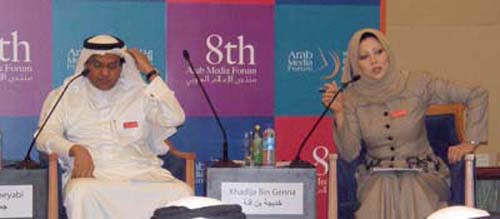
Jamil Al Theyabi and Al Jazeera anchor Khadija Ben Genna discuss TV fatwas
on Arab satellite channels (Abu-Fadil)
He said the most dangerous aspect of the trend was presenting ill-qualified, self-appointed experts to provide advice to the uninitiated.
Worse than TV were control-free new media such as email and mobile phones for issuing fatwas from unknown sources, Thiyabi said.
He noted that ignorant preachers play with simpletons' minds, mislead youth, and recruit suicide bombers and terrorists through this new fatwa industry and that the umma, or Islamic nation, must get a grip on the situation.
The comments, during a workshop that preceded the forum's opening, grouped Islamic religious leaders who debated the hot potato issue that has prompted the Organization of the Islamic Conference's Fiqh (doctrine) Academy to detail the conditions and manners of issuing fatwas.
The proliferation of fatwa channels has also spawned celebrity preachers, akin to their televangelist counterparts in the West, who cash in on followers' devotion, participants were told.
"Fatwa shows are the first line of defense against violence and terrorism," argued Fahad Al Shimeimri, chairman of Al Majd TV in Saudi Arabia, adding that his station's preachers were qualified, understood the stakes, could communicate with audiences and were able to handle call-ins.
New media have allowed preachers to enter people's homes, giving rise to sharp competition aimed at drawing audiences and viewers, said Abdel Hamid Ansari, a professor of Islamic Studies at Qatar University.
In addition to fame and stardom, fatwas have turned into a lucrative business, he said.
At another session, Pulitzer Prize-winner Seymour Hersh packed the main conference hall with a talk on investigative journalism and lauded Arab media for reporting on issues neglected (intentionally or otherwise) by U.S. print and broadcast outlets.
"The [American] press turned cheerleaders and did not challenge the WMD [weapons of mass destruction] story," he said of former President George W. Bush's war on Iraq. "Bush helped me in my career and I hope [US President Barack] Obama doesn't."
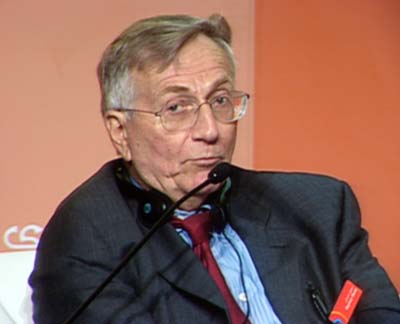
Seymour Hersh promotes investigative journalism in Dubai
(Abu-Fadil)
But he cautioned that Obama was falling in the same trap as Bush and that nothing, except the leadership, had changed with regard to Afghanistan and Pakistan.
Hersh praised Dubai for being at the cutting edge and urged Arab journalists to push for good governance but said an investigative journalist was like a dead rat brought to a party.
"Nobody likes us, but if you don't do what you do, you can't change things," he said, adding that the Internet had changed the face of journalism.
The Web's increasing dominance and print media's accelerating demise in the West, don't seem to have adversely affected newspapers in the Arab World where growth is still key, experts said.
Kuwait and Saudi Arabia have seen more newspapers come onto the print scene in parallel with the rapid increase of online media and portals drawing ever more readers and advertisers in the region.
With the emergence of a knowledge society, new media and platforms are increasingly contributing to user-generated content and providing average citizens with vehicles to supplement traditional media reports.
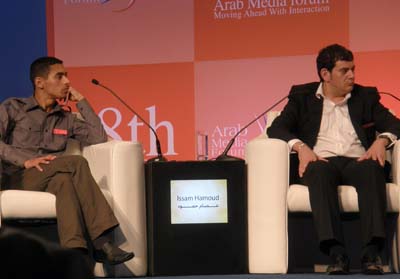
Algerian blogger Issam Hamoud and Google UAE's Husni Khuffash
weigh in on new media and new platforms (Abu-Fadil)
"What's new isn't just media but the handling of news, and anyone can be a content creator," said Sultan Al Bazei, CEO of Saudi Arabia's Attariq Communication.
That scared more traditional journalists at the forum who feared editors, fact checkers and any modicum of ethical standards would disappear altogether.
They also raised questions about the credibility of citizen journalism and whether video clips shot on mobile phones could be considered news.
In another twist, representatives of foreign TV channels broadcasting in Arabic came under close scrutiny with detractors questioning their aims and messages.
Panelists from the BBC, France24, Russia Today and U.S. government-financed Al Hurra defended their stations, insisting they were not mouthpieces for the governments that funded them.
It followed charges of "foreign political agendas" permeating those media.
"We don't represent French policy or the French view but a French perspective," said Nahida Nakad, deputy editor of France 24, an all-news French channel that recently increased its Arabic-language programming to compete in a crowded broadcast landscape long dominated by the BBC.
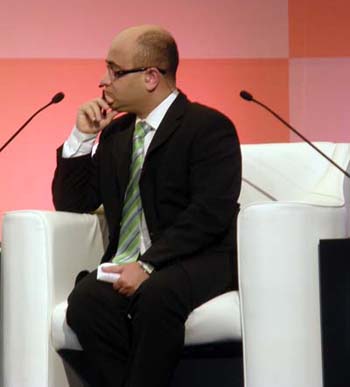
Hosam Al Sokkari, head of BBC Arabic TV, radio and online
services (Abu-Fadil)
Later a very heated discussion erupted between the news heads of Al Arabiya and Al Jazeera channels who argued over Israel's war on Gaza and their respective linguistic differences over coverage of that conflict.
"Martyr is a religious term, I cannot issue a judgment on the dead person because I am not God," said Al Arabiya's Nabil Khatib during the Gaza session, to the dismay of Ahmad Al Sheikh of Al Jazeera who said his station's hyped coverage aimed to halt conflicts and victims' suffering.
Khatib said he must consider his audience despite the old adage that what bleeds leads, and that a lot of news reaching newsrooms during conflicts was misleading.
Other sessions dealt with the worldwide financial crisis and the media's handling, or mishandling, thereof.
The harsh reality of online media taking over worldwide means funders' mentality has to change and advertisers will seek "fast fooders," participants heard experts say.
A key question raised at the forum was whether industry was willing to invest in new content and delivery systems. Conferees agreed on the need for extensive training to upgrade and update journalists' skills.
The two-day forum organized by the Dubai Press Club (www.dpc.org.ae) drew over 600 people from the Arab world and beyond.
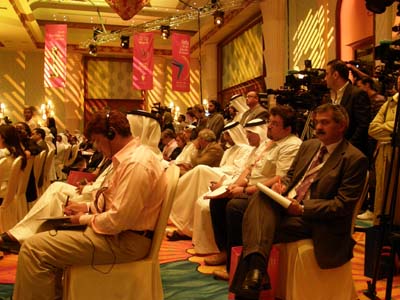
8th Arab Media Forum draws over 600 participants (Abu-Fadil)
It concluded with the highly touted Arab Journalism Awards handed to print reporters, editors and publishers from across the region.
The forum and awards are supported by Dubai's ruler, Sheikh Mohammad bin Rashid Al Maktoum.
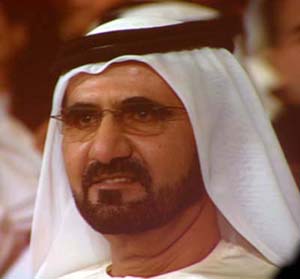
Dubai ruler Sheikh Mohammad bin Rashid
Al Maktoum at Forum opening (Abu-Fadil)